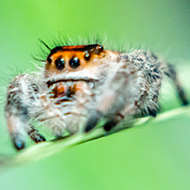
The spiders will be helping people to cure arachnophobia.
ZSL London Zoo has welcomed regal jumping spiders to its Tiny Giants exhibit, and these distinctive creatures will be helping arachnophobes overcome their fear in the zoo's Friendly Spider Programme.
Dave Clarke, London Zoo's head of invertebrates, said: “At just 22mm regal jumping spiders may be small, but are very cute as they have recognisable ‘face’ with forward pointing eyes and some of the best vision in the spider world.”
These spiders, hailing from the southeastern United States and the West Indies, can jump 10cm forward from a standing start by suddenly flexing the muscles in their legs. They are also known for their courtship dance, which the male regal jumping spiders do to attract a mate.
The spiders have arrived in time for participants of the zoo's Friendly Spider Programme to meet them, in their quest to overcome a fear of spiders. The programme, which runs periodically, teaches participants all about spiders, squashes myths, and gives them a chance to practice catching spiders.
“We’ve made it our mission to quash as many myths about spiders as possible and help people overcome their phobia, converting spider-squishers into bug lovers through our world-leading Friendly Spider Programme – and I think these cute new arrivals are going to be a big help,” said Dave Clarke.
“As well as helping to alleviate a phobia that can seriously impact your day-to-day life, the Friendly Spider Programme has directly supported wildlife conservation projects for invertebrates, including the successful reintroduction of the native semi-aquatic Fen raft spider.
“This species is listed as threatened in the UK, but the fen raft spider’s range is now increasing thanks to conservation efforts.”
Images (C) ZSL London Zoo



 Zoetis is to present a CPD event for free to members of the British Veterinary Nursing Association (BVNA).
Zoetis is to present a CPD event for free to members of the British Veterinary Nursing Association (BVNA).